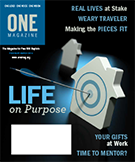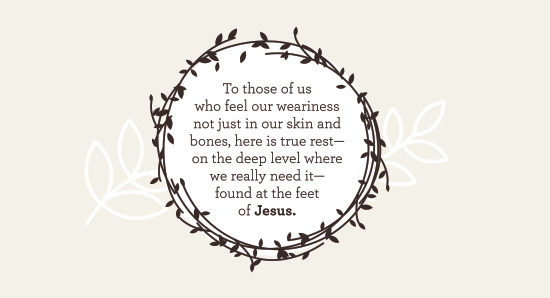
February-
March 2014
Life on Purpose
------------------
|

Weary Traveler
by Carol Reid
Weary traveler. From John Bunyan to Bill Monroe, the picture of the pilgrim, loaded down with fatigue, struggling to reach his destination, is an image familiar to all of us. We identify. Just look at the word:
W-E-A-R-Y = WE-ARE. And WE ARE weary.
Problem
Weariness is part of the human condition, a result of the curse on mankind in Genesis 3. Age is not a factor; Isaiah 40 reminds us that even young people grow weary. Activity level is not a factor; whether we work 60 hours a week or sit in a hospital room, weariness is a problem. Occupation is not a factor: day care worker, ditch-digger, accountant, or ticket-taker—we all struggle with weariness.
Weariness takes many forms, depending on its cause. Weariness can result from physical fatigue when we’ve worked in the garden, cleaned the house, or even shopped all day long. At other times, when we’re unable to do any of that because of health reasons, we are still weary.
Weariness can stem from emotional fatigue when stress, obligations, pressures, discouragement, and grief weigh us down. We can even experience spiritual fatigue, fighting the attacks of the evil one in relentless battles.
Throughout Scripture we meet weary people:
-
2 Samuel 23:10: The warriors are so weary that their
hands cramp around their swords.
-
Jeremiah 9:5: The people wear themselves out
committing sin.
-
Isaiah 43:22: Israel is even weary of God.
-
Habakkuk 2:13: People are weary for nothing.
-
Genesis 27:46 and Job 10:1: Rebekah and Job are
weary of their lives.
What about you? How would you fill in the blank? I am weary of _____________. I am weary of my kids? My bills? My disease? My pain? My needy friend? My job? My assignment in life?
It’s a good thing that neither Galatians 6:9 nor 2 Thessalonians 3:13 stop with “Be not weary.” No, Scripture goes on to say, “Be not weary in well doing.” So, what is “well doing”? These passages give us some clues:
-
2 Thessalonians 3:10 lays out the principle: if you
don’t work, you don’t eat.
-
2 Thessalonians 3:11
exhorts those who are
disorderly, lazy, busy
bodies.
-
2 Thessalonians 3:12
commands believers to
work quietly and earn their
own living.
-
Galatians 6:2 encourages us to
bear one another’s burden.
-
Galatians 6:5 teaches us to bear our own
burden.
-
Galatians 6:4 says to prove or test our work.
-
Galatians 6:8 brings up the principle of sowing and
reaping; we are to sow to the Spirit.
-
Galatians 6:6 and 6:10 remind believers to give to the
work of the Lord and His servants.
Doing well includes caring for our families, earning a living, avoiding laziness, helping others, doing our best, planning for the future, and giving to God’s work. Yes, we may be weary, but not in those things.
“Umm,” you say, “You’re not helping me here. I’m tired of those ‘well-doing’ things, too. I’m wrung out. I’m exhausted. I’m discouraged. I’m just weary.”
I know. And our gracious heavenly Father knows, too. He has given us a prescription for dealing with our problem.
Prescription
First, take care of our bodies. Rest. Eat right. Exercise. Recreate. Connect.
God’s principle from Creation—from the very beginning—is a day of rest. So, what is your day of rest? Our busy lifestyles and demanding careers, our multi-generational families, our near and long-distance friendships, our wired and digitized and ever-connected technology consume our waking days. We have trouble going to sleep at night, much less taking a day off for rest.
For some of us, even Sunday seems less than restful by the time we’ve taught children’s church, cooked Sunday dinner, gone to choir practice, and maybe added a baby shower and a meeting or two to the day. But the physical curse of weariness demands we take care of our bodies with rest according to the design and model of our Creator. What needs to change in your life to accomplish that?

Second, know that our Heavenly Father does not grow weary. Isaiah 40:28-30 reminds us that He is still in charge. No matter how difficult our loads, no matter how weighed down and weary we feel, He can handle it.
Isaiah 40 goes on to encourage us with a third principle. If we wait on the Lord, He will supply the strength we need. When we wait on the Lord, Isaiah 40:31 promises, we can run and not be weary. (That’s amazing to a little, fat lady like me who can’t run 10 yards without my tongue hanging out.) We can walk and not faint. My mother is mostly confined to her wheelchair, but what a promise—to walk without tiring.
We can mount up with wings like eagles. We’re soaring here; we’re flying to mountaintops, above the storms. We’re strong and powerful and beautiful and inspiring. When we wait on the Lord—our powerful Creator, who never grows weary—we know strength and hope and provision. Trust Him: His plan, His wisdom, His timing, and His love for you. He is a good God who wants what is best for each of us.
A fourth reminder comes from Hebrews 12:3. Most of us remember the first two verses of the chapter—the “cloud of witnesses” and the “run with patience” parts. But verse three points us to Jesus. In our weariness, consider Him. When we start to drag and falter in our well-doing, think about all Jesus endured for us. “How can I do less than give Him my best and live for Him completely, after all He’s done for me?” the words of an old chorus implore.
Then, remember the truth from Matthew 11:28-30—the sweet invitation of our Savior to “come to me.” If we are weary, heavy laden, Jesus promises rest. Maybe we need to spend a little more time with Him. Notice that verse 29 assures us that He will give rest for our souls. To those of us who feel our weariness not just in our skin and bones, here is true rest—on the deep level where we really need it—found at the feet of Jesus.
Promise
Back we go to Galatians 6:9 for the bright conclusion of the verse. Don’t grow weary in well doing, because in due season, we will reap. There’s a harvest ahead. Don’t give up now.
We often work because a reward lies ahead.
-
The trip is long and tiring, but we look forward to
visiting with friends and family or our wonderful
vacation.
-
The work week is difficult, but we cross off our “to do” list, anticipating Friday, when we’ll go out to dinner
with our spouse—or maybe see the grandkids.
-
The yard work seems exhausting, but we find reward
in the beautiful hydrangeas or the glimpse of a blue
bird in the backyard.
-
The hike is strenuous, but the view from the hilltop is
glorious.
-
The dinner preparations take all day (for a meal that
people finish in 15 minutes), but our guests are happy,
and the fellowship is sweet.
Our work is validated by the reward. No matter what our harvest looks like, God has demonstrated this principle throughout His creation: we reap what we sow. Our labor counts. Our work is noticed. God sees and rewards what we have planted. So, don’t grow weary. Don’t give up.
William Carey, “father of modern protestant missions,” took the gospel to India in 1793, only to meet with poverty, the death of his son, the mental illness of his wife, malaria, and a host of other discouragements. It was not until 1800, seven years after his arrival in the country, that he baptized his first convert. Seven years of toil and hardship and weariness passed before he saw any fruit.
When Carey died in 1834, after spending 41 years (without a furlough) in India, he left behind 700 converts, Bible translations, educational and social reforms, and the beginning of a powerful worldwide missionary movement. His tireless well doing continues to produce fruit—even today—because he diligently planted the gospel in India.
God is faithful. In due season, we will reap if we faint not.
About the Writer: Carol Reid serves as Women Active for Christ Representative for Middle Tennessee and actively participates in WAC at Cross Timbers Free Will Baptist Church. Longtime librarian at Welch College, Carol has authored numerous Bible studies for Treasure, WNAC’s quarterly study guide. See www.wnac.org.
|
|

